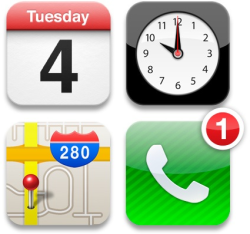Today's launch points to an 'emerging market' iPhone


But one thing made clear over the past twenty-four hours, in particular a long-standing belief that the iPhone 5, in whatever incarnation it may be simply is not ready yet, is still a way away. I'm willing to be wrong, but I'm calling this one a gut feeling.
For all we know, the iPhone 4S is the 'iPhone 5'.
Apple Live: Analysis and up-to-the-second coverage
But it does not take a genius to realise that certain considerations require an additional 'something else', to make that feature come to fruition. In amidst a difficult mobile market, Apple is betting on its iPhone brand model alone to smash the current trends and to make it favour more in its direction.
In my view, it falls down to one crucial factor: the 4G network.
Apple has been relentlessly suing Samsung, a purveyor of 4G-enabled smartphones. Both Verizon and T-Mobile have stepped in to the ongoing case in the United States to point out that, by halting sales of Samsung 4G smartphones could hamper not only their own, but equally government targets of getting the 4G network up to speed.
Yet, some are declaring that the iPhone 5 will be a 'Sprint exclusive', capable of accessing the WiMAX 4G network, after the phone underdog bought $20 billion worth of iPhones. Betting the entire company on the next iPhone is not only reckless, but entirely genius if the company can pull it off. Having said that, considering Apple's secrecy policy, Sprint's apparent move seems to contravene the behind-the-scenes deals inevitably going on between Apple and the cell networks.
Considering the 4G network is still a technology yet to be widely adopted, this points only to today's launch being an iPhone 4S -- an Apple branded phone designed solely for the emerging markets; a market Apple has yet to crack.
Apple does not make new technologies the norm; Apple waits until a technology is the norm, before it adds it to the vast spectrum of other technologies and features in its current incarnation of iPhones.
4G, however, though becoming more common throughout the United States, requires a vast amount of power for its high-speed network. Many of these 4G enabled phones are weighty, and require chunk additional power packs to match the same battery longevity of ordinary phones.
Considering Apple's suit separate suit against Samsung regarding which phone giant can claim to have the "world's thinnest smartphone" in the United Kingdom, it points to only one outcome.
Apple will not compromise the thinness of its iPhones to hold additional battery packs, meaning either the iPhone 5 will allow additional power packs to be installed -- something Apple has never done before, nor will it reasonably ever do -- or the iPhone 4S will not contain 4G technology. Because, if it is set for the still emerging 3G market, 4G is still a generation away, and would be pointless and unsuitable for such environments.
Apple, simply put, needs more time for 4G technology to evolve, giving Apple itself the opportunity to develop 4G capable phones which aren't the size of a house brick.
Related:
- Apple Live: Analysis and up-to-the-second coverage
- ZDNet's Great Debate: iPhone Yes vs. iPhone No
- Next-gen iPhone: It's nothing without iOS, iCloud
- iPhone 'thinnest smartphone' win; Apple brings Samsung patent fight to UK
- Sprint's huge bet on iPhone is a potential disaster
- What the iPhone 5 could mean for mobile payments: nothing yet
- Apple's iPhone 5 key, but iCloud more strategic
- iPhone 5: The hurdles to overcome for voice control
Around the network:
- CNET Roundup: Apple's iPhone event - all coverage
- WSJ: Sprint commits to $20B order for 30M iPhones
- Play along with CNET's iPhone event bingo!
Read more: